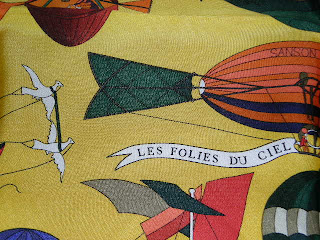Yesterday I suffered a severe shock while lunching at Le
Galapagos! I ordered boiled fish with a
mushroom sauce, green beans and steamed apples – a fascinating combination, you
will agree – but when the food arrived I searched in vain for the apples. I summoned my long suffering waiter and asked
him sternly what had happened to the apples.
At first he failed to comprehend my question, but when I explained that
I expected apples (fruits!) he was quite crestfallen and admitted,
shame-facedly, that the menu card had lied!
‘Pommes Vapeur’ should have actually read ‘Pommes de Terre Vapeur!’
Yes ladles and gentlemints, this is yet another instant of a
European native taking liberties with apples.
‘Potato’ in French is called ‘Pomme de Terre’ – apple of the earth. Some local German dialects have the same idea
– Erdapfel (earth apple). So next time
you order Pommes Frites (in German Pommes for short) let me warn you that you
will not receive fried apples, but ordinary chips (French fries if you live in
Oregon or any of the other, lesser, United States).
The apple has always played a central role in the fruity
universe of northern Europe , I suspect because it grows
there abundantly and keeps well into the winter. Pears rot, peaches are demanding, plums turn
mushy and get eaten by wasps, grapes remain tiny and sour, berries are strictly
seasonal – but the apple grows to perfection all over northern Europe
and continues to thrive in our larders until well into late winter. That is surely the reason why the fruit used
by Eve to tempt Adam was translated as ‘apple’ into German, French, and English
– the original pomegranate meant nothing to our ancestors.
The apple was a great staple of northern European food
supplies, especially before the newfangled imported current staples
arrived. Pre-potato Europeans lived on
porridge, apples, cabbage, pulses, bread, miscellaneous roots, and the odd bit
of protean here and there. So when new
fruits and vegetables arrived on the scene the apple was pressed into service for
the creation of names for them. ‘Loveapple’
or Liebesapfel is an old word for tomato.
Pineapple is the English word for Ananas (in French and German). Apfelsine is the German word for orange.
But the usage of ‘apple’ in creating names for other objects
is not limited to fruit & vegetables.
Adam’s Apple refers to a part of our anatomy, located on the neck – the
German Adamsapfel and the French Pomme d’Adam.
Then there is the French Pomme de Pin – pine cone. And the German Pferdeapfel – the round end
product of a horse’s digestive process.
Or the German for eyeball – Augapfel; the English phrase ‘Apple of my
eye’ reminds us that this usage was known in English as well.
A woman with a certain bodyshape is referred to as
‘apple-shaped’ – we could just as easily say ‘blueberry-shaped’ or ‘orange-shaped’,
but the apple remains our main fruity reference point. Then there is the word Pomander – a hollow
pottery ball filled with potpourri and hung inside a wardrobe to discourage
moths (doesn’t work, by the way) – the ‘pom’ refers us back to French
apples. Interestingly enough, while the German
and English words for ‘apple’ are almost the same, the French ‘Pomme’ is quite
different. I am operating without a
proper dictionary here, but suspect the French version comes from the Latin –
surely the goddess Pomona has lend her name to the fruit, or vice versa? Indeed, speculating here with the benefit of
not being hampered by a dictionary in my flights of fancy, is ‘Pomegranate’
also related to ‘Pomme? Does it mean
something like ‘Apple with lots of pips’?
I vaguely seem to recall that Pomona
was into pomegranates …..
Moving on, we come to ‘pompous’ – might I suggest this word
is related to ‘pomme’ and related to its round inflated shape? How about ‘pomade’, the stuff men put into
their hair to make it look shiny – like a shiny apple …. And while I am sticking out my neck, what
about translating ‘Madame Pompadour’ as Mrs Hard Apple (dour = dure?), perhaps
a French version of ‘Tough Cookie’? Incidentally,
the famous producers of macaroons, Ladure, picked a bad name for their ware –
it suggests to me that their macaroons are dry and tough! Or what about ‘Pompier’ – fire fighter? Their red uniforms are strongly reminiscent
of apples, no? What do you mean, French
fire fighters don’t wear red uniforms?
Maybe they did in the past?
Oh well. I guess I
lost the momentum.


















